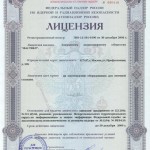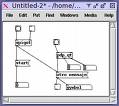eGPL gets its first derivative license going: Creative Uncommon License (CUL), created by Thiago Alves Maximo. Unlike GPL, eGPL allows for license modification.
In other words, you can fork our license! And that makes eGPL the first recursive license since the license applies to the usage of the license itself.
The CUL license aims at using eGPL approach for contents. It was presented in an academic research group meeting there:
hypertexte » comptes-rendus » CR séance du groupe HYPERTEXTE – 25 juin 2009.
This statement is interesting and stresses out the importance of developpers and academic ethics in post-2001 situation. eGPL is starting to get some press and lawyer interest, we are opening an informal law professionnal reviewing committee and planning the next step of eGPL online web application development.
 The eGPL Exception Management application has been released as Beta version on the main site. Check it and make sure to give us comments about this either here or on the mailing list!
The eGPL Exception Management application has been released as Beta version on the main site. Check it and make sure to give us comments about this either here or on the mailing list!
This Beta web app works, but is not yet nice and lacking many features in the Roadmap. If you’re interested in participating to the code, of course it’s place under eGPL and coded in Ruby on Rails (2.2), mail us at egpl AT egpl DOT info.
 During a discussion with Jean-Noel Montagné, founder of Art-Sensitif (check the Lab in Main D’Oeuvre @ Saint Ouen) and member of Bricolabs initiative, he gave me his view on restrictive Licenses through the Pure Data debate [1] [2] over a license governing PiDiP by Yves De Goyon. I think this represents the fundamental debate which separate true open source such as GPL from politically-oriented statements such as EGPL.
During a discussion with Jean-Noel Montagné, founder of Art-Sensitif (check the Lab in Main D’Oeuvre @ Saint Ouen) and member of Bricolabs initiative, he gave me his view on restrictive Licenses through the Pure Data debate [1] [2] over a license governing PiDiP by Yves De Goyon. I think this represents the fundamental debate which separate true open source such as GPL from politically-oriented statements such as EGPL.
The question here is not to persuade people that they should use EGPL. In fact, they should not, or rather they should never have to use EGPL. But in case of abuse, the message is here: there is an alternative which can make a whole difference if some end users start to abuse the fundamental right of the author – that his will and intent be respected, or start neglecting his founding role, well, then he may remind these end-users that they live in an eco-system where all abuses cannot always go unanswered.
 If you want to read the EGPL and give early comments and feedbacks, please contact us:
If you want to read the EGPL and give early comments and feedbacks, please contact us:
egpl <AT> egpl . info
This call is valid till the post announcing the Public Release.
During FOSDEM, I got to meet several people from the speakers and audience, providing me with insightful questions, remarks and a surprisingly warm welcome, even from people who SHOULD be against EGPL.
 For example, Bdale Garbee from Debian (and HP Open Source & Linux Chief Technologist) said “Well, it’s clear that EGPL is orthogonal to Debian, but I can definitely see where you’re coming from and the clear political message that this License sends to the people using Open Source in questionable way”.
For example, Bdale Garbee from Debian (and HP Open Source & Linux Chief Technologist) said “Well, it’s clear that EGPL is orthogonal to Debian, but I can definitely see where you’re coming from and the clear political message that this License sends to the people using Open Source in questionable way”.
Some Open Source Developers immediately got the idea and explained to me various horor stories on usage of their work: either from publicly-founded projects being misused or discoveries about their code being used for goals clearly against their ethics. One comment related to Open Source Software was particularly acute: “Politics and managers don’t listen nor understand the licenses and ways of Open Source, but what they get is that through EGPL, they may have to buy software that was previously free just based on their own actions and goals, and this, they will clearly understand it.”
Globally, a very interesting take on EGPL with a welcome that I didn’t expect.
EGPL is working on the license, currently as a draft version. We will be going to FOSDEM 2009 in Brussels so if you want to get in touch there, contact us by email!
Welcome to WordPress. This is your first post. Edit or delete it, then start blogging!


 If you want to read the EGPL and give early comments and feedbacks, please contact us:
If you want to read the EGPL and give early comments and feedbacks, please contact us: